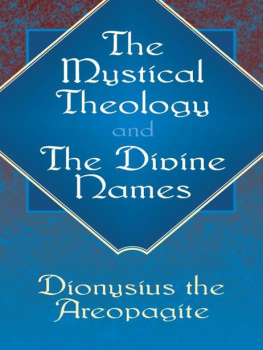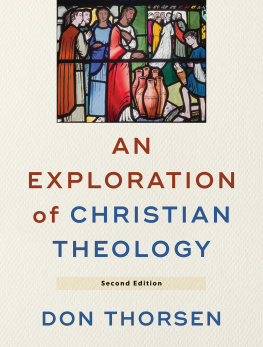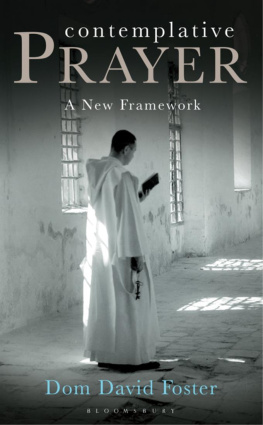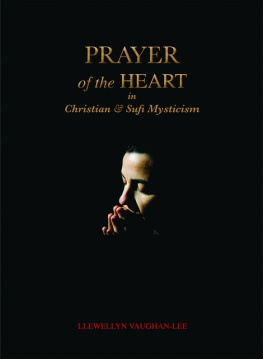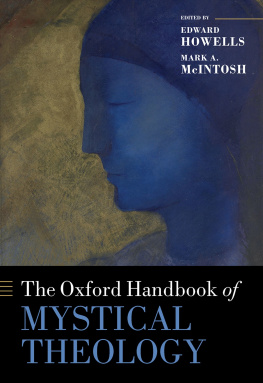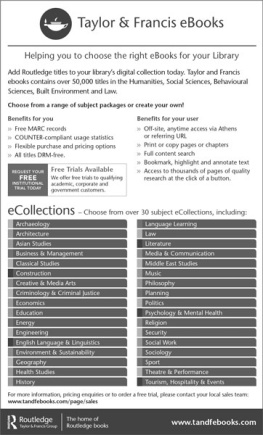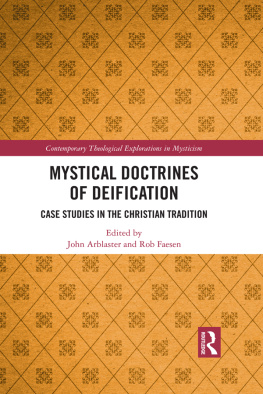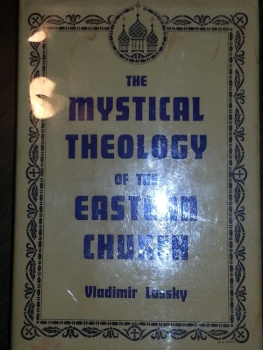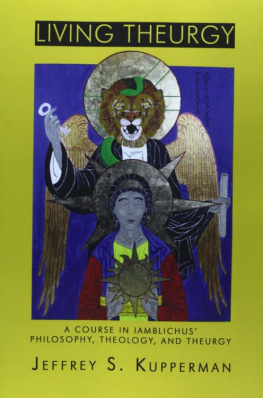C.E. Rolt - The Mystical Theology and the Divine Names
Here you can read online C.E. Rolt - The Mystical Theology and the Divine Names full text of the book (entire story) in english for free. Download pdf and epub, get meaning, cover and reviews about this ebook. year: 2012, publisher: Dover Publications, genre: Religion. Description of the work, (preface) as well as reviews are available. Best literature library LitArk.com created for fans of good reading and offers a wide selection of genres:
Romance novel
Science fiction
Adventure
Detective
Science
History
Home and family
Prose
Art
Politics
Computer
Non-fiction
Religion
Business
Children
Humor
Choose a favorite category and find really read worthwhile books. Enjoy immersion in the world of imagination, feel the emotions of the characters or learn something new for yourself, make an fascinating discovery.
The Mystical Theology and the Divine Names: summary, description and annotation
We offer to read an annotation, description, summary or preface (depends on what the author of the book "The Mystical Theology and the Divine Names" wrote himself). If you haven't found the necessary information about the book — write in the comments, we will try to find it.
C.E. Rolt: author's other books
Who wrote The Mystical Theology and the Divine Names? Find out the surname, the name of the author of the book and a list of all author's works by series.
The Mystical Theology and the Divine Names — read online for free the complete book (whole text) full work
Below is the text of the book, divided by pages. System saving the place of the last page read, allows you to conveniently read the book "The Mystical Theology and the Divine Names" online for free, without having to search again every time where you left off. Put a bookmark, and you can go to the page where you finished reading at any time.
Font size:
Interval:
Bookmark:

Bibliographical Note
This Dover edition, first published in 2004, is an unabridged republication of Dionysius the Areopagite on the Divine Names and the Mystical Theology, originally published by the Society for Promoting Christian Knowledge, London, and the Macmillan Company, New York, in 1920.
Library of Congress Cataloging-in-Publication Data
Pseudo-Dionysius, the Areopagite.
[De mystica theologia. English]
The mystical theology; and, The divine names / Dionysius the Areopagite; translated by C.E. Rolt.
p. cm.
Originally published: Dionysius the Areopagite on The divine names and The mystical theology. London: Society for Promoting Christian Knowledge; New York: Macmillan, 1920.
Includes bibliographical references and index.
9780486148267
1. GodName. 2. GodKnowableness. 3. Mysticism. I. Title: Mystical theology; and, The divine names. II. Rolt, C. E. (Clarence Edwin) III. Pseudo-Dionysius, the Areopagite. De divinis nominibus. English. IV. Title: Divine names. V. Title.
BR65.D63D4513 2004
230.14dc22
2004043897
Manufactured in the United States of America
Dover Publications, Inc., 31 East 2nd Street, Mineola, N.Y 11501
Table of Contents
PREFACE
THE translations of which the present volume consists are the work of a scholar who died at the age of thirty-seven. It has been felt that since the translator did not live to write a preface his work should be introduced by a few prefatory words. My excuse for accepting that office is that I probably knew the lamented writer as well as any one living. He was deprived of both his parents while very young, left almost friendless, and entrusted to my care from the age of fourteen. He had already shown promise of unusual ability. I sent him to Kings College School, where in the opinion of its distinguished Head, the Rev. Dr. Bourne, he could have done anything if only he had been given the health. At Oxford he was awarded the Liddon Studentship.
Nothing can show more clearly what was thought of him by competent judges in Oxford than the following letter written by the Professor of Latin, A. C. Clark:
He was one of the best scholars who passed through my hands at Queens College, and I know no one who made greater progress after coming into residence. In those early days he had wonderful powers of work. I was seldom so delighted as when he earned the great distinction of being mentioned for the Hertford University Scholarship in Latin. At the time everything seemed to be within his grasp. But most unfortunately his health failed shortly afterwards, and he was never able to do himself justice. Still, of recent years he wrote a remarkable book, full of fine thought, brilliantly expressed, which was much admired by good judges. I well remember, too, his Latin sermon preached at St. Marys not long ago. It was delivered with feeling and fire, and seemed to me an admirable performance. I am sure that he would have gained distinction in the Church, if he had lived.
He seemed to me a fine and noble character, free from all mortal taint.
He was a singularly refined and religious character, combining the acuteness of a philosophic mind with the fervour of a mystic. He therefore possessed undoubted qualifications for a study of Dionysius, with whose neoPlatonic ideas and mystical tendencies he was in the warmest sympathy.
The Introduction, containing a masterly exposition of Dionysian principles, is entirely the translators work, and, within the limits which he set himself, may be called complete. Rolts fervid and enthusiastic disposition led him to expound Dionysius with increasing admiration as his studies continued. He laid his original introduction aside, because to his maturer judgment it seemed insufficiently appreciative.
In its final form the Introduction is beyond all question a very able and remarkable piece of work. There are, however, several instances where the writers enthusiasm and personal opinions have led him to unguarded language, or disabled him from realizing the dangers to which the Areopagites teaching tends. He does indeed distinctly admit that Dionysius has his dangers, and says in one place definitely that the study of him is for the few: but the bearing of the whole theory of the Supra-Personal Deity on the Person of Christ and the Christian doctrine of the Atonement requires to be more thoroughly defined than is done in the exceedingly able pages of Rolts Introduction. It is not the business of an editor to express his own views, but yet it seems only reasonable that he should call the readers attention to questionable expositions, or to dogmatic statements which seem erroneous. In four or five places the editor has ventured to do this: with what effect the reader must decide. The Introduction of course appears exactly as the Author left it. The few additional remarks are bracketed as notes by themselves.
It is only right to add that the translator laboured under certain disadvantages. The original text of Dionysius is perplexing and confused, and no modern critical edition has as yet been produced. Rolt was frequently in doubt what the Author had really written.
But, beside the drawback incidental to any student of Dionysius, there was the fact of the translators solitary position at Watermillock, a village rectory among the Lakes, shut off from access to libraries, and from acquaintance with former writers on his subject. This is a defect of which the translator was well aware, and of which he pathetically complained. Friends endeavoured to some extent to supply him with the necessary books, but the lack of reference to the literature of the subject will not escape the reader of these pages. He was always an independent thinker rather than a person of historical investigation.
Hence it is that one branch of his subject was almost omitted; namely, the influence of Dionysius on the history of Christian thought. This aspect is far too important to be left out. Indeed Dionysius cannot be critically valued without it. An attempt therefore has been made to supply this omission in a separate Essay, in order to place the reader in possession of the principal facts, both concerning the Areopagites disciples and critics.
VV. J. S.-S.
INTRODUCTION
I.THE AUTHOR AND HIS INFLUENCE IN THE LATER CHURCH
THE writings here translated are among the extant works of a theologian who professes to be St. Pauls Athenian convert Dionysius, and points his claim with a background of historical setting. But the claim collapses beneath a considerable weight of anachronisms, by far the chief of which is the later neo-Platonism in almost every paragraph. In fact, these writings appear to reflect, and even to quote, the doctrines of the Pagan philosopher Proclus, who began lecturing at Athens in A.D. 430. Moreover, it is probable that the Hierotheus, who figures so largely in them, is the Syrian mystic Stephen bar Sudaili: a later contemporary of the same thinker. The Dionysian writings may therefore be placed near the very-end of the fifth century.
The true name of their author is entirely unknown. He was probably a monk, possibly a bishop, certainly an ecclesiastic of some sort. His home is believed to have been Syria, where speculative theology was daring and untrammelled, and his works are the chief among the very few surviving specimens of an important school. The pious fraud by which he fathered them upon the Areopagite need not be branded with the harsh name of forgery, for such a practice was in his day permitted and even considered laudable. Nor does it rob them of their value, any more than certain parts of the prophecies ascribed to Isaiah are worthless because they are by another hand. If the Dionysian writings were historical documents the matter would be otherwise, just as the Gospel Narrative would lose nearly all its value if it were a later fabrication. But they are not historical documents. Their scope is with the workings of mans mind and spirit in a region that does not change, and their findings are equally valid or invalid whatever be their date. And yet even historically they have an interest which does not depend on their authorship. For, in any case, they spring from a certain reputable school within the Christian Church, and they were accepted by the Church at large. And thus their bold path of contemplation and philosophy is at least permissible to Christians. This path is not for all men, but some are impelled to seek it; and if it is denied them within the Christian pale, they will go and look for it elsewhere. Nietzsche is but one of those who have thus disastrously wandered afar in search of that which is actually to be found within the fold. Had he but studied the Dionysian writings he might have remained a Christian. At the present time these works have an added interest in the fact that, since neo-Platonism has strong affinities with the ancient philosophies of India, and may even owe something directly to that source through the sojourn of Plotinus in the Punjab, such writings as these may help the Church to meet with discriminating sympathy certain Indian teachings which are now becoming too familiar in the West to be altogether ignored. The bearings of this matter on the missionary problem are obvious.
Next pageFont size:
Interval:
Bookmark:
Similar books «The Mystical Theology and the Divine Names»
Look at similar books to The Mystical Theology and the Divine Names. We have selected literature similar in name and meaning in the hope of providing readers with more options to find new, interesting, not yet read works.
Discussion, reviews of the book The Mystical Theology and the Divine Names and just readers' own opinions. Leave your comments, write what you think about the work, its meaning or the main characters. Specify what exactly you liked and what you didn't like, and why you think so.

